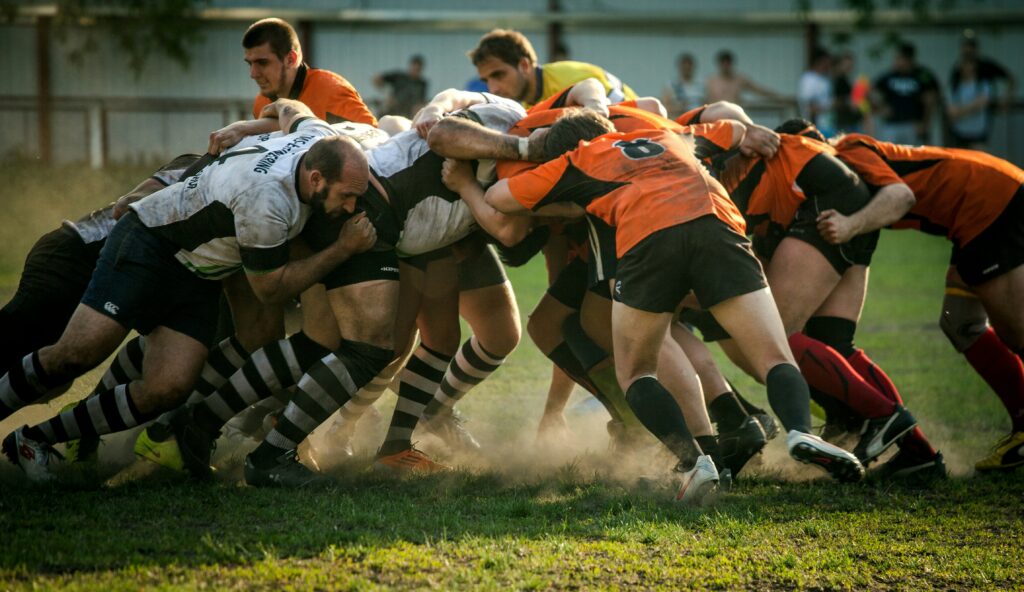When the roars of the crowd die down, can rugby players trade that experience to be the person to guide the team? Sidelines spoke exclusively to x-Saracens front-rower Tom Woolstencroft about the challenges of switching from player to coach as he takes over the dugout at Bishop’s Stortford RFC.
Tom Woolstencroft’s experience as a player speaks for itself. In his first season at Saracens, he won the Premiership and Champions Cup double, then added another Premiership title to his collection in the 2022/23 season. Now he’s taking on a new role as forwards coach at National League One side Bishop’s Stortford RFC – a challenge he believes his career has prepared him for well.
“I think the way I developed my rugby was playing alongside some of the best players and learning from them,” Woolstencroft says.
“I found that as soon as you get more senior in your career, you’re not just a teammate – you do become a coach to a lot of the younger boys coming through.”
Woolstencroft suffered multiple concussions, which led him to an early retirement and inevitably towards the sidelines.
“I found through a lot of the injuries and concussions I had that I would often have these periods where I’d be unable to play, and even though I didn’t have any kind of formal coaching capacity, I really enjoyed giving tips and feedback to the younger lads coming through.
Ultimately, when it got towards the end and I was told to retire, I was gutted and distraught, but there was also a little relief. If I hadn’t been told to stop, I probably would have kept going,” Woolstencroft adds.
Retirement isn’t always easy for a professional athlete if sport is all they’ve ever known. However, it can give them the chance to evolve, grow and reflect on their unique experiences as a stepping stone into something now. Now, Woolstencroft’s looking at his next chapter, which allows him to share all his technical knowledge and leadership skills.
“There are a lot of technical elements to the front row, and there are not many around who can give that kind of advice,” Woolstencroft says.
However, coaching isn’t just about technical ability. It’s also about managing people, their emotions and egos, especially within the world of sport.
Woolstencroft already understands how to support the players around him with some experience of being the captain for Saracens in multiple games.
“There are so many different types of captains. Some captains speak really well, some captains lead by example, and there are ones who do both. I was very much a captain who led by example, but as a coach, I can’t lead by example on the pitch anymore.”
Elements of the transition are helped by transferable skills from player to coach, including sports psychology, strength and conditioning principles and others.
“I’d say video analysis is something that, as a player, you always do anyway. In that professional environment, I was glued to the laptop for at least half an hour when I was reviewing my own game. So, I think that’s an aspect which I won’t need to pick up too much,” Woolstencroft says.
Becoming a coach means finding a new toolbox of skills, and Woolstencroft admits he has some ‘bad habits’ he needs to work on.
“I had a lack of patience at times, whether that was with my teammates or my coaches. When a player usually loses their rag, it probably comes from the fact that they’re frustrated about how they’re playing themselves.
“I guess I must be a bit more patient as a coach, you must be more controlled. I think I must learn a level of organisation – as a player, you don’t have to lift a finger.”
With an emphasis on improving his player management in his coaching career, Woolstencroft has a pragmatic view.

“Everyone’s different. In rugby, honesty is the best policy; players appreciate being told how it is.” No sugar coating, no fancy speeches – just straight talk.
“If you’re honest, then players will respect you more, especially when it comes to team selections or tough decisions,” he says.
Woolstencroft is genuinely excited for the challenge of being a coach. Additionally, the role holds a sense of nostalgia, coaching at a club where he played at just five years old.
“I haven’t really thought about the long-term future,’ Woolstencroft admits.
He’s currently balancing two worlds at the moment – his new career in rugby coaching and his new venture in property. However, the focus for now is just to “enjoy and see what happens.”
Aspiring coaches and rugby fans can learn a lot from Woolstencroft. His story shows that success as a coach doesn’t happen overnight, but learning from his own experiences and maintaining passion for the sport will allow him to excel in his new role.
Woolstencroft’s just getting started, and with a whistle in hand and advice on his mind, a whole new generation of rugby players are ready to follow his lead. Coaching might just become his new love.
Sidelines Recommends

The team sport of mental health
From tackling stigmatising language in the media to filling gaps in care for those struggling, there is a team off the field working to improve mental health in sport. In Volunteers’ Week, Sidelines spotlights the work of Sport in Mind. Mental health within sport is…

Leaps of faith: the world of elite cliff diving
From the circus to Red Bull’s World Series Cliff Diving competition, Stéphane Lapointe takes Sidelines into the world of elite cliff diving.

The falconers: protectors of the pitch
Sidelines explores how some of sport’s little-known avian art – falconry – helps get sports venues ready for action.High above the pitch, before a single whistle blows or a seat is filled, the real warm-up act begins. A hawk slices through the early morning air,…




